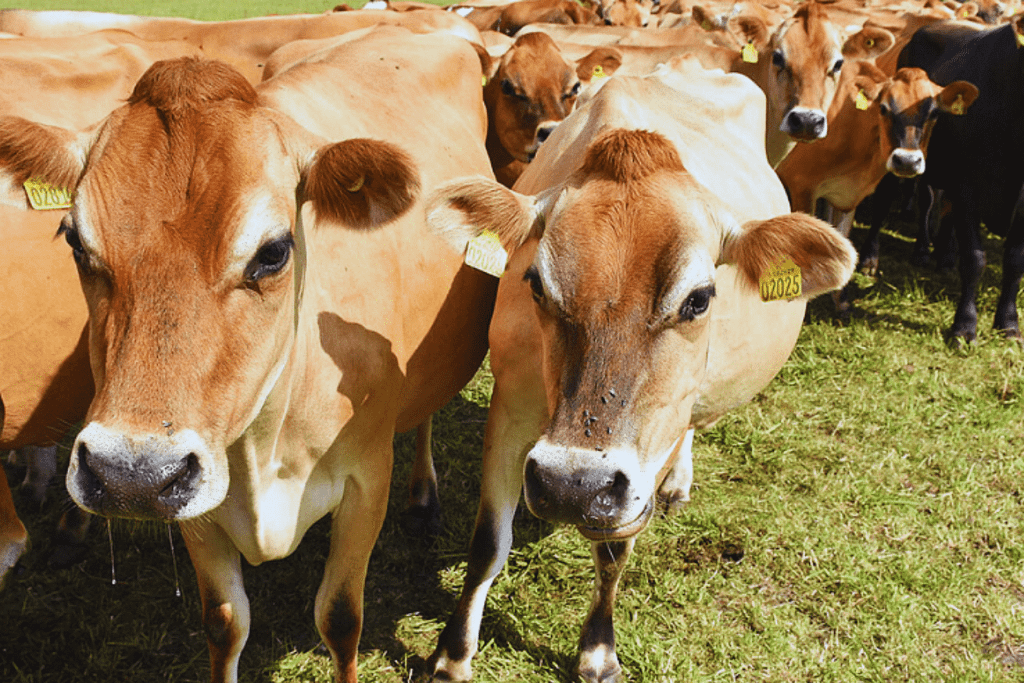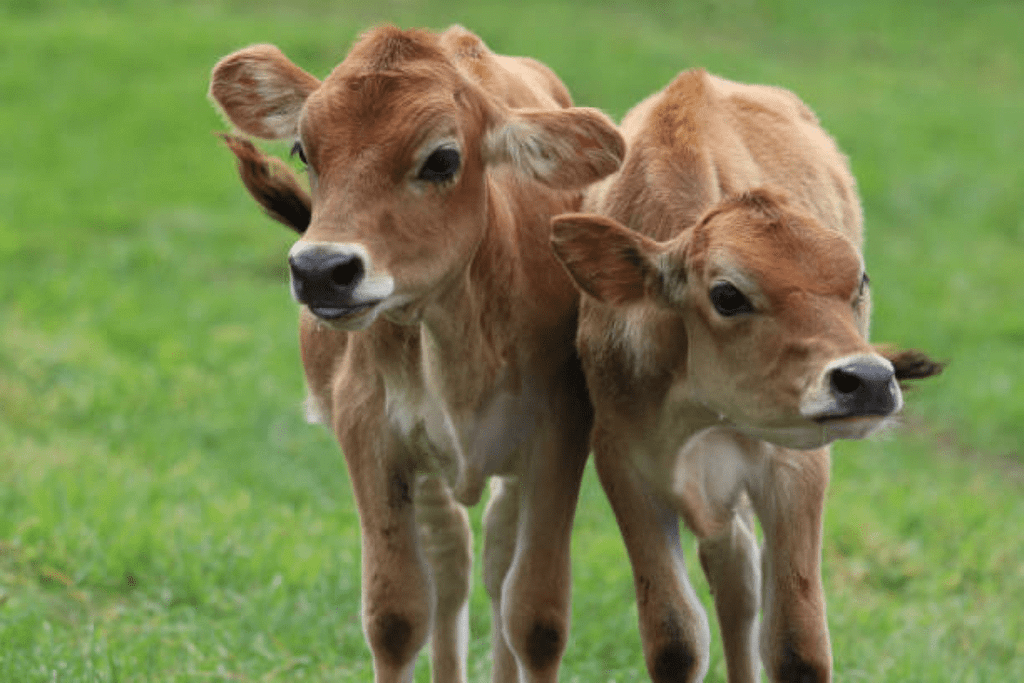This article is essential if you are a cow lover or a potential owner of the giant Jersey cow. Today, We will cover Jersey Cow Price, Daily Milk Yield, Life Span, Feed, and Size to inform you about the cow and help you make the perfect decision before owning one. So, let’s dip into the central part of this article and keep reading.
Lots of people are interested in the Jersey Cow these days. It’s become trendy among folks who love Cow breeds and farmers. People are curious about this cow because it’s good in many ways and can live in different types of weather.
One big reason people check out info on the Jersey Cow is that it’s known for making a lot of milk. If someone wants more milk, they might think about getting this cow. Another reason is that these cows are tough and can handle different places, which is good for farmers who want solid and adaptable cattle.
People who might want to buy a Jersey Cow are also looking for details about its traits, how to keep it healthy, and the best ways to take care of it. This article and resources give much information about these cows, helping people decide if they want one and teaching them how to look after it.
Read Also: Gir Cow Price, Milk Per Day, Images, Food, Adaptability, And Dimensions
Jersey Cow Breed History & Background

Jersey cows are dairy cows from an island called Jersey, between England and France. The island’s distance from other places affected how the cows developed. Even though these cows have been around for a long time, people in the late 1700s and early 1800s actively worked to improve them. They brought in cows from France to help with this.
People on the island and later in other places focused on choosing which cows should have babies based on certain qualities. They wanted cows that could make a lot of milk and survive well on the island’s limited resources.
Jersey cows are known for their light brown color and white facial markings. They are medium-sized and are admired for their beauty. But, more importantly, they are valued for making a lot of milk, which is rich and good for making butter and cheese.
Because Jersey cows are so good at making milk, they are now found in many parts of the world, like North America, Europe, and Oceania.
The American Jersey Cattle Association keeps track of these cows and promotes the breed in the United States. Other countries have similar groups. Today, Jersey cows are one of the most liked dairy cows everywhere. People appreciate them for their delicious milk, and they are good at living in different farming conditions.
Related Content: Punganur Cow Price, Daily Milk Yield, Life Span, Feed, and Size Discussed!
Size, Height, Weight & Life Span of Jersey Cow
Jersey cows are considered a small to medium-sized breed. On average, adult Jersey cows stand around 48 to 52 inches (122 to 132 cm) tall at the shoulder. They are known for their elegant, refined appearance and compact, well-proportioned body.
| Characteristic | Jersey Cow |
|---|---|
| Size | Small to Medium |
| Height at Withers | 48 to 52 inches (adult) |
| Weight (Cows) | 900 to 1,200 pounds (mature) |
| Weight (Bulls) | 1,200 to 1,800 pounds (mature) |
| Life Span | 12 to 15 years (average) |
A Jersey cow’s weight can change depending on its age, family traits, and what it eats. On average, mature Jersey cows typically weigh between 900 and 1,200 pounds (410 and 545 kg). Bulls, being more giant, can weigh between 1,200 and 1,800 pounds (545 and 820 kg).
The average lifespan of a Jersey cow is around 12 to 15 years, although individual lifespans can vary. Factors influencing lifespan include the quality of care, genetics, and overall health. Jersey cows can lead healthy and productive lives with proper nutrition, veterinary care, and a suitable environment.
You May Like: Red Sindhi Cow Price, Daily Milk Yield, Life Span, Feed, and Taking Care
Ideal Food For Jersey Cow
Jersey cows need to eat good and balanced food to stay healthy, produce milk, and feel good like other cows that make milk. The ideal food for Jersey cows includes a mix of forages, grains, and supplemental nutrients.
Here are some components of a perfect diet for Jersey cows:
Forages: Fresh, high-quality pasture is an excellent source of nutrition for Jersey cows. It provides essential vitamins and minerals. Jersey cows like to eat alfalfa and clover because these foods have a bunch of protein and energy. This helps the cows stay healthy and have lots of energy to do cow things.
Grains: These grains can be part of the diet to provide energy. Corn, in particular, is often used as an energy-dense feed for dairy cows, a good source of protein that can be added to balance the protein content in the diet.
Supplemental Feed: Ensure the cows receive a balanced mineral and vitamin supplement to meet their nutritional requirements. Essential for maintaining electrolyte balance.
Silage: Fermented corn silage is a common component in dairy cow diets, providing energy and fiber. Fermented hay can also add variety and nutrition to the diet.
Fresh Water: Adequate, clean water should always be available to Jersey cows. Water is crucial for digestion, milk production, and overall health.
It’s essential to get help from a cow doctor or a food expert to make a particular food plan for your Jersey cows. They will look at things like how old the cows are, how much they weigh if they are making milk, and if they are healthy. Checking and sometimes changing the food plan is essential to ensure the cows stay healthy and make lots of milk.
Must Read: Sahiwal Cow Price, Milk Per Day, Food, Adaptability, Dimension And Origin
Jersey Cow Milk Per Day
The milk production of Jersey cows can vary based on factors such as genetics, age, diet, health, and stage of lactation. Jersey cows are known for their high butterfat content, making them desirable for dairy products like cheese and butter. A healthy Jersey cow can produce around 5 to 6 gallons of milk daily during peak lactation.
It’s important to note that milk production is not constant throughout the lactation period. It typically peaks shortly after calving and then gradually decreases. Most cows go through a dry period, a period without milking, before calving again. The lactation cycle and peak production can vary among individual cows.
Dairy farmers often use management practices, including proper nutrition, regular milking routines, and optimal health care, to maximize milk production and the overall well-being of Jersey cows. Consulting with a veterinarian or dairy nutritionist can provide more accurate milk production and management details if you have specific information about a particular Jersey cow or herd.
Jersey Cow Price And Cost

Jersey cows can cost different amounts. It depends on how old they are if they are healthy, and if they will have baby cows. Also, where you are buying or selling them matters. The price can increase if many people want these cows or if the person selling or breeding them is well-known. [See Real-Time Market Price Click Here]
Region Jersey Cow Price Range
- India (National Average) INR 40,000 to INR 1,00,000
- Tamil Nadu INR 40,000 to INR 1,00,000
- Odisha INR 40,000 to INR 1,00,000
- Karnataka INR 40,000 to INR 1,00,000
- Pakistan PKR 80,000 to PKR 2,00,000
Jersey Cow Price in India
The cost of Jersey cows in India can be anywhere from INR 40,000 to INR 1,00,000 or even higher. This depends on different things.
Jersey cow price in Tamil Nadu
Tamil Nadu’s price is around the same as the national average, between INR 40,000 and INR 1,00,000, depending on how much people want them and how many are available.
Jersey cow price in Odisha
In Odisha, the prices are also likely to be similar to the national average, ranging from INR 40,000 to INR 1,00,000, based on what’s happening in the local market.
Jersey Cow Price in Karnataka
In Karnataka, it’s the same story. Prices could be between INR 40,000 and INR 1,00,000, depending on factors like supply and demand.
Jersey Cow Price in Pakistan
The prices can differ in Pakistan, where Jersey cows may be sourced. They could be from PKR 80,000 to PKR 2,00,000 or even more. It depends on various things, just like in India.
Related Content: Mini Highland Cow: Lifespan, Size, Weight, Price, Care Tips 2024
Possible Illnesses That Can Impact Jersey Cow
Jersey cows, known for their high-quality milk production, are susceptible to various illnesses impacting their health and productivity. Proper management practices and regular veterinary care are crucial for maintaining the well-being of these cows.
Here’s an overview of some common illnesses that can affect Jersey cows:
Mastitis: An inflammation of the udder tissue, often caused by bacterial infection, leading to changes in milk quality.
Lameness: Can result from hoof problems, injuries, or joint issues, emphasizing the importance of regular hoof care and monitoring.
Metabolic Disorders: Occurs during high milk production, causing an abnormal increase in ketone bodies in the blood.
It is common around calving when there’s a sudden demand for calcium.
Bovine Respiratory Disease (BRD): Similar to pneumonia, BRD can result from various bacteria and viruses, causing respiratory distress.
Bloat: Gas accumulation in the rumen, often caused by certain forage types, requiring preventive measures.
Parasitic Infections: Affect the digestive system and overall health. Ticks and lice cause discomfort and health issues.
Reproductive Issues: Can lead to infections after calving. Various factors, including nutritional deficiencies, may impact reproductive health.
John’s Disease: A chronic bacterial infection affecting the intestines, causing diarrhea and weight loss.
Bovine Viral Diarrhea (BVD): A viral infection causing respiratory and reproductive issues.
Infectious Diseases: A bacterial infection affecting the reproductive and urinary systems. A bloodborne disease causing anemia and jaundice.
Farmers should collaborate with veterinarians to establish preventive measures, conduct regular health checks, and address concerns promptly. Ensuring proper nutrition, hygiene, and a comfortable living environment is vital for Jersey cows’ overall health and productivity.
Taking Care Of Jersey Cow
Taking care of Jersey cows involves a combination of proper nutrition, health monitoring, and providing a comfortable environment. Here are some essential aspects of caring for Jersey cows:
Nutrition: Provide a well-balanced and nutritionally complete diet to meet the specific needs of Jersey cows, especially during different stages of life (e.g., lactation, dry period, gestation). To support milk production, offer high-quality forage, alfalfa, clover, and appropriate concentrates.
Health Monitoring: Make regular appointments with a cow doctor to monitor the cows’ health, fix any possible health problems, and do things to prevent issues.
Stick to a plan for giving vaccines to guard against common sicknesses in the area.
Housing and Comfort: Provide a clean, dry living environment to prevent hoof and skin issues. Regularly clean and maintain barns and bedding. Ensure good air circulation to avoid respiratory problems.
Reproductive Management: Implement a well-managed breeding program to ensure optimal reproductive performance.
Monitor cows closely during calving, assisting when necessary to minimize complications.
Parasite Control: Implement a deworming program to control internal parasites. Monitor for signs of external parasites and take appropriate measures.
Water Supply: Make sure there’s always clean and easy-to-reach water to keep the cows hydrated and help them make milk.
Hoof Care: Schedule regular hoof trimming to prevent lameness and related issues.
Social Interaction: Consider grouping cows based on age, production stage, and social compatibility to reduce stress and promote social interaction.
Record Keeping: Maintain accurate records of vaccinations, health treatments, breeding history, and other relevant information.
Biosecurity Measures: Keep the cows healthy by isolating new animals before letting them join the group. This helps stop diseases from spreading.
Comfort during Extreme Weather: Provide shade and cooling measures during hot weather and ensure adequate shelter during cold or inclement weather.
Training and Handling: Handle cows gently to reduce stress and make routine tasks, such as milking, more comfortable.
Farmers can promote the health, productivity, and overall well-being of Jersey cows in their herd by addressing these aspects of care. Regular observation, prompt intervention, and attention to individual needs contribute to a successful and sustainable dairy operation.
Conclusion
The Jersey cow is a special kind that many people who love cows and farmers like. They are well-known for making a lot of milk, being able to adapt to different situations, and being tough overall. These cows come from the island of Jersey, and their history involves carefully choosing which cows have babies to ensure they give a lot of milk and can handle harsh conditions.
The average size of Jersey cows, standing at 48 to 52 inches tall and weighing between 900 and 1,200 pounds for cows and 1,200 and 1,800 pounds for bulls, reflects their small to medium-sized stature. Jersey cows can live for 12 to 15 years. Taking good care of them, giving them the right food, and getting help from a cow doctor helps them live a happy and long life.
To get the most from Jersey cows, giving them a good mix of food, like grass, grains, and extra nutrients is essential. A healthy food plan, checked by an expert, keeps them healthy and ensures they make a lot of milk and stay strong overall.
People like Jersey cows because they make milk that’s rich and perfect for making butter and cheese. These cows are liked worldwide and are now one of the favorite dairy cows.
Caring for Jersey cows means dealing with possible health problems like mastitis, lameness, and metabolic disorders. Working with cow doctors, doing things to prevent issues, and keeping their living area clean and comfy all help keep them healthy and make lots of milk.
The cost of Jersey cows varies based on age, health, and location. Prices in different regions, such as India and Pakistan, fluctuate within specified ranges, reflecting market demand and supply dynamics.
Farmers must do many things to ensure Jersey cows stay healthy and happy. This includes checking their health often, ensuring they eat right, controlling parasites, and planning when they have babies. By caring for all these things, farmers can create a good environment that helps Jersey cows stay healthy, make lots of milk, and be well overall.
Frequently Asked Questions About Jersey Cow
Next, we will answer some frequently asked questions related to the Jersey cow breed:
What are the characteristics of Jersey cows?
Jersey cows are a type of dairy cow known for their unique traits:
Size: Jerseys are relatively small to medium-sized cows with a light and agile build.
Color: They are typically light fawn to dark brown, often with a white face and dark eyes.
Personality: Jerseys are known for their calm and friendly demeanor, making them easy to handle.
Milk Production: Although smaller than other dairy breeds, Jersey cows are renowned for their high production and butterfat content
What are Jersey cows good for?
People mainly raise Jersey cows for their milk. The milk has a lot of butterfat and protein, which is excellent for making cheese, butter, and other dairy stuff. Because Jersey cows are friendly and can adapt well, some people also keep them as pets or for learning about cows on farms.
What is the difference between a Desi and a Jersey cow?
Desi cows, also known as indigenous or local cows, and Jersey cows differ in several aspects:
Size: Desi cows are generally larger, while Jersey cows are smaller and more compact.
Milk Composition: Jersey cows produce milk with a higher butterfat content than Desi cows.
Adaptability: Desi cows are adapted to local climates and conditions, whereas Jersey cows may require more management in diverse environments.
Milk Yield: Jersey cows have a higher milk yield than Desi cows.
Is Jersey milk cow milk?
Yes, Jersey milk is cow’s milk. It comes from Jersey cows, a specific breed of dairy cattle known for producing high-quality milk.
Which cow milk is best?
The “best” cow milk choice varies based on what you like and how you want to use it. Jersey milk is liked for its tasty flavor and lots of butterfat, making it great for cheese and butter. But the suitable milk for you might depend on what you enjoy, what nutrition you need, and what’s easy to find.










[…] are highly respected for excellent milk production and are famous for their rich, creamy quality. The Pure Sahiwal Cow can thrive in harsh […]